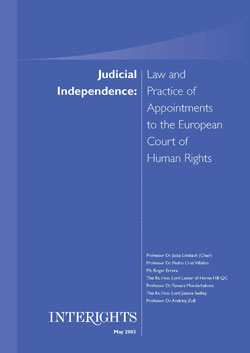Jutta Limbach, Pedro Cruz Villalón, Roger Errera, , Tamara Morshchakova, Stephen Sedley, Andrzej Zoll (INTERIGHTS, May 2003)
 In February 2003, a group of eminent European jurists met in London to consider the issue of judicial independence with respect to the current procedure for judicial appointments to the European Court of Human Rights. This report details their deliberations and contains their recommendations.
In February 2003, a group of eminent European jurists met in London to consider the issue of judicial independence with respect to the current procedure for judicial appointments to the European Court of Human Rights. This report details their deliberations and contains their recommendations.
In the last forty years, the European Court of Human Rights has been at the forefront of the development of regional and international human rights jurisprudence. While paying tribute to the Court, this report notes that its credibility and authority risk being undermined by the ad hoc and often politicised processes currently adopted in the appointment of its judges.
As a leading human rights court internationally, it would be anomalous and unacceptable if appointments to the Court failed to meet the international human rights standards that it is charged with implementing, including those requirements relating to the independence and impartiality of judges. In addition, flawed appointment procedures leave open the prospect that judges selected will lack the requisite skills and abilities to discharge their duties. This risks having an adverse effect on the Court’s standing and on the development of authoritative human rights jurisprudence in Europe.
The current system of appointments to the Court involves the nomination of three candidates at a national level, followed by an election by the Council of Europe’s Parliamentary Assembly. At both stages, the processes lack transparency and accountability.
At a national level, States are given absolute discretion with respect to the nomination system they adopt. The Council of Europe does not provide guidelines on appropriate procedures; nor does it require States to report on or account for their national procedures. Even in the most established democracies, nomination often rewards political loyalty more than merit.
At the international level, the Convention provides that the power to appoint judges lies solely with the Parliamentary Assembly. The Committee of Ministers has adopted a limited review role, which on paper allows it to question States’ lists of nominees and nomination procedures. However, in practice the Committee of Ministers gives the impression of being more interested in safeguarding State sovereignty, than in ensuring the quality of candidates nominated.
The only safeguard in the current system lies with the Sub-Committee on the election of judges, appointed by the Parliamentary Assembly’s Committee on Legal Affairs and Human Rights. The Sub-Committee consists of parliamentarians, most of whom lack experience in human rights or international law. It makes recommendations to the Parliamentary Assembly on the most suitable candidate based on a superficial assessment of the curricula vitae of nominees and a 15-minute interview. The deliberations of the Sub-Committee are held in camera and it does not give reasons for its ranking of candidates.



